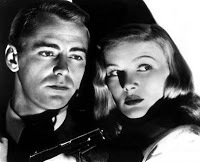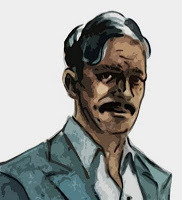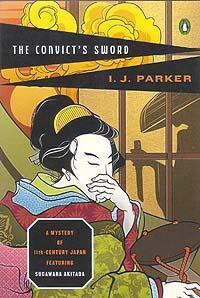B.R. Stateham's Blog, page 29
April 22, 2011
Make It Familiar To The Reader

Yesterday we talked about getting the weapons right. Today let's talk about adding little things into the story that a reader can instantly identify and feel comfortable knowing they are there.
I have two characters named Turner Hahn and Frank Morales. Homicide detectives. One of them, Turner, fell into a pot load of money from an inheritance. So he indulges in his hobby of buying old American made muscle cars and rebuilding them himself.
His favorite is a '67 Shelby Mustang 350.
But he has others. And throughout the novel(s) he and his partner exchange rides and drive a different car. The cars, predictably, become magnets to a lot of readers and keep them involved with the story. I planned this from the beginning. I knew this would happen--and sure enough, from the comments I've heard from a few who have read the stories, the muscle cars do exactly what I thought they would.
Readers identify themselves with the cars. They've had one in their past; their father or mother had one. A friend had one when he was a teenager and they had balls of fun with it.
What it does is rekindle old memories. Past times.
And rekindling old memories make the cars become magnets. Or, more likely, sticks of glue. They stick the reader into the story and make it more personal. Which is, frankly, what a good writer should endeavor to do. Not just write a story. But write a story and make it personal. Make it 'his' or 'her' story. 'Cause I gotta tell'ya; make a story personal and you've hooked that reader for life. They'll come back over and over again to read more of your stuff.
Published on April 22, 2011 08:19
April 21, 2011
The Right Weapon for the Right Job

Weapons.
Writing noir or hardboiled they're important. Very important. Conversely, that's where a lot of writers screw the pooch . . . to use a quaint little American phrase. Ya' gotta get the right weapon in the right hands. And then ya' gotta make sure there are no incongruities.
Like thumbing off the safeties on a Smith & Wesson revolver. Or using a hand weapon--any form of pistol--in a firefight that has ranges farther than . . . say . . . the length of a livingroom. Little things like that. It's amazing how it can drive an afficionado of the genre into fits of a screaming dispair.
I know. Made that mistake. Heard about. Forcefully and in no uncertain terms.
Little things. It's the little things a fan picks up and nags about the most. If you've established a character, and if the story line is humming along nicely, it's the little nitpicking things a fan will hone onto like acqusition radars on an F-14 Tomcat. Nail you to the wall. Skin you with a dull knife and hang the hide out to dry.
And they should. Listen to'em. They'll make you a better writer.
Published on April 21, 2011 11:23
April 19, 2011
Creating fantasy worlds
One of my books (Banners of the Sa'yen) had a fan who made an unusual comment; he said the story was less than exciting. But the world the story was set in was interesting.
The comment was unusual because the reader identified a portion of fantasy riting many readers are familiar with and want--but few articulate about ie., the worlds in which the characters of a book live in.
And that's where I think a lot of writers don't pay enough attention to when they write. They sweep over their landscapes with broad strokes of the brush--don't take the time to describe and create a feeling . . a strangeness . .of a world never before seen.
That's half of the experience in reading fantasy. Or Sci-Fi (I'm old school in this; I lump fantasy in with Sci-Fi and can't tell the two apart. Although I know, in reality, everyone else does)
So when I write---anything---I try to put in just enough of the surroundings to get the reader's imagainations fired up. But not drown their imaginations with too much.
Yeah, I know; that in itself can be a dicey situation.
The comment was unusual because the reader identified a portion of fantasy riting many readers are familiar with and want--but few articulate about ie., the worlds in which the characters of a book live in.
And that's where I think a lot of writers don't pay enough attention to when they write. They sweep over their landscapes with broad strokes of the brush--don't take the time to describe and create a feeling . . a strangeness . .of a world never before seen.
That's half of the experience in reading fantasy. Or Sci-Fi (I'm old school in this; I lump fantasy in with Sci-Fi and can't tell the two apart. Although I know, in reality, everyone else does)
So when I write---anything---I try to put in just enough of the surroundings to get the reader's imagainations fired up. But not drown their imaginations with too much.
Yeah, I know; that in itself can be a dicey situation.
Published on April 19, 2011 08:36
•
Tags:
descriptive-writing, fantasy, imagination
Heather Toye and I both are authors working in the stable...
Heather Toye and I both are authors working in the stable of authors at Trestle Press. Trestle Press is a publisher currently building up an ebook empire of new and dynamic writers. The publishing house is relatively new--the authors are new and exciting. And we all want to push our names out there and to make the person who signed us up successful as well.
Heather's genre is similar to what I write--but different as well. It's that difference in writing styles which makes the world of books so exciting for readers.
Try this little piece I lifed off her blog. I think you'll like it.
Debtor's Chip: Devin Excerpt
The fire crackles and smolders in the rusty metal barrel. Smoke drifts towards the night sky. He slides his hand into his pocket and grasps the only thing he has left besides the clothes on his back. Its smooth surface and rounded edges reminds him. It reminds him of how he came to be here, huddled among the four other homeless people trying to get warm on this bitter winter night.
The bitter cold matches how he feels inside. A lump of disgust rises in his throat. This only possession he managed to keep seems to freeze him to the bone. No longer able to stand the weight of this small disc, he brings it out of his pocket intent on thrusting it into the fire.
"Well, what have you got there?" The husky voice slipped like honey out of the woman's mouth. He looked furtively at her from the corner of his eye, briefly thinking she may have been beautiful once.
"Mind your own," he grumbled. "It's none of your concern."
She glimpsed the white disc he was about to toss into the flame, and brought out its twin from her own pocket. "It looks a lot like mine, wouldn't you say?"
He turned a paler shade than white and slumped to his knees. "My God," he croaked, "how many of us has he ruined?"
"Looks like five that we know of, including you, that is," came the reply from a smallish man that to Devin largely resembled a weasel.
Five… five… five… the number echoed through his mind. Should he feel relieved, knowing that this has happened to others? Or saddened, knowing his was not the only life ruined. At this moment, he could only feel a sort of numbness sweep through his body. Maybe I've been in the cold too long.
He stood once again, shaking. Shaking from the cold, shaking from this knowledge gained. His head bowed, he spoke, "So, every one of us here tonight has one? We all have the Debtor's Chip?"
A man that looked to be in his sixties spoke up. "Share your story, then we will tell you our tales of misery."
Devin looked at the four others who shared this space around the fire barrel. "I guess it starts with this," he held the chip up for the others to see. They all nodded their heads knowingly and waited for the tale to unfold.
Heather's genre is similar to what I write--but different as well. It's that difference in writing styles which makes the world of books so exciting for readers.
Try this little piece I lifed off her blog. I think you'll like it.
Debtor's Chip: Devin Excerpt
The fire crackles and smolders in the rusty metal barrel. Smoke drifts towards the night sky. He slides his hand into his pocket and grasps the only thing he has left besides the clothes on his back. Its smooth surface and rounded edges reminds him. It reminds him of how he came to be here, huddled among the four other homeless people trying to get warm on this bitter winter night.
The bitter cold matches how he feels inside. A lump of disgust rises in his throat. This only possession he managed to keep seems to freeze him to the bone. No longer able to stand the weight of this small disc, he brings it out of his pocket intent on thrusting it into the fire.
"Well, what have you got there?" The husky voice slipped like honey out of the woman's mouth. He looked furtively at her from the corner of his eye, briefly thinking she may have been beautiful once.
"Mind your own," he grumbled. "It's none of your concern."
She glimpsed the white disc he was about to toss into the flame, and brought out its twin from her own pocket. "It looks a lot like mine, wouldn't you say?"
He turned a paler shade than white and slumped to his knees. "My God," he croaked, "how many of us has he ruined?"
"Looks like five that we know of, including you, that is," came the reply from a smallish man that to Devin largely resembled a weasel.
Five… five… five… the number echoed through his mind. Should he feel relieved, knowing that this has happened to others? Or saddened, knowing his was not the only life ruined. At this moment, he could only feel a sort of numbness sweep through his body. Maybe I've been in the cold too long.
He stood once again, shaking. Shaking from the cold, shaking from this knowledge gained. His head bowed, he spoke, "So, every one of us here tonight has one? We all have the Debtor's Chip?"
A man that looked to be in his sixties spoke up. "Share your story, then we will tell you our tales of misery."
Devin looked at the four others who shared this space around the fire barrel. "I guess it starts with this," he held the chip up for the others to see. They all nodded their heads knowingly and waited for the tale to unfold.
Published on April 19, 2011 07:59
April 18, 2011
People We Think We Know

I have a book out called Death of a Young Lieutenant . About an art thief who, in the opening days of World War One, is asked by his commanding officer to prove the innocence of junior officer accused of murder. Two problems instantly arise. One, there's a war going on. You may not know this, but in the first two and a half weeks of World War One it looked as if the armies of the Kaiser was going to consume all of France in one mighty gulp of military appetite. How the war eventually evolved into stalemate through trench warfare wasn't very apparent in the opening days of the conflict.
The second problem is Jake Reynolds, the officer asked to become a sleuth, is an art thief. Perhaps the wrong person to ask to prove someone's innocence since he is, by definition, a felon himself.
And this is the blog's main theme today; the people we think we know. This novel--the entire series I want to write--came into being because of someone I thought I knew. Knew all my life. Saw him on a daily basis. Liked the guy, enjoyed being in his company. And never thought for one minute the man was anything else other than what he appeared to be.
But the old boy was hiding secrets from those that knew him. Big secrets.
He'd been in World War II. Had combat citation ribbons that would run down his chest if he put his old uniform on. Medals, for heroism, from two different countries. And lots of medals at that. Did absolutely fantastic things in the war--things writers like Robert Ludlum or Ian Fleming would have made fortunes writing about. In short; the man was an honest-to-god, GEN-U-INE . . . HERO.
And nobody knew. Nobody knew.
So I have to wonder; how many more of those like my old friend are out there? When . . or if . . . are we going to hear their stories? And they don't have to be heroes. They could be monsters. Geunine, horrible, nightmarish monsters who--for some reason or another--have straightened up and are honest abiding citizens. For now.
The Jake Reynolds series is dedicated to these people. The heores and monsters of the world who keep their secrets well hidden. All the way to their deaths.
Published on April 18, 2011 06:25
April 17, 2011
The Trip Wire

Okay, here's the question of the day: you're a writer. A writer of ebooks. And obviously you want to sell'em. So you begin social networking. Find sites all over the internet that works for you and you make your presence known. You constantly update. You continuously 'friend' for new friends.
The question is this . . . When? When does this active social networking gig begin to pay off? What trip-wire has to be stumbled over before there is a sudden bounce in sales and a sharp rise in fans buyng your books that feeds on itself for a long period of time?
Vincent Zandri and J.A. Konrath come to mind when I think about this. They sell thousands of their books a month. A MONTH!! That's impressive to say the least. Mind-boggling is more like it. It literately just boggles the mind.
So did they do it just be social networking?
Konrath has said repeatedly his previous writing gig with big publishers didn't help him in the least when it came to selling ebooks. Vincent Zandri is not so sure. I asked him that very question the other day on a--get this--social network site and he said he thought his previous exposure had to have helped some.
I have a sneaking suspicion there's more to it than just social networking. Like it has always been . . . and always will be . . .I think you have to be in the right place and at the right time to be 'discovered.' And like always--a huge amount of pure, unadultered blind LUCK comes into play.
Social networking. Hard work. Exposure. And fricken' blind luck makes the successful writer. I can do the first three. It's the LUCK thing that bugs me.
How do you stumble into blind luck?
Published on April 17, 2011 08:01
April 15, 2011
So the other day I was watching Turner Classics and fell ...

So the other day I was watching Turner Classics and fell into watching Alan Ladd, Veronica Lake and William Bendix in Dashiell Hammitt's 'The Glass Key.' Black and white photography. Lots of odd angles, dark shadows. Good stuff, Maynard.
Hard boiled film making at its best. Partially due, I suggest, because it was filmed way back when the majority of films were done in black and white. There's something about the medium of film work sans color that is just naturally made for noir/hardboiled material.
The shadows seem more menacing. The play of light across a person's face more distinct. It's like the absense of color automatically creates mood and innuendo. But when you throw in great actors and actresses, well brother . . . it can't get any better.
For years there's been critics who claim Veronica Lake wasn't much of an actress. Sorry. Wrong there, buddy. That face of her's--that long blond hair. The way she could deliver her lines in a monotone voice that wasn't quite so monotone. No, I say just the opposite; I think Vernoica Lake was a great actress for this genre. Tough--yet vulnerable.
Matched up with Alan Ladd and the two were a great combo. Ladd was the perfect tough guy. Smart, cool, tough as saddle leather. The epitome of what a tough gumshoe should be.
William Bendix was probably the more versatile of the lot. He could play tough. He could play the bumbling fool. He could play the bad guy. Maybe not very well known to movie buffs of today. But you should know him. Bendix was the best second-fiddle in show business.
'The Glass Key' was very good. But if you ever get a chance to see Ladd and Bendix and . . . I think . . . Lake in 'The Blue Dahlia' (a script written by Raymond Chandler) don't pass it by. Watch it. It's fabulous.
Published on April 15, 2011 11:55
April 14, 2011
A Smitty two-novella set
So it's done. A two-novella piece featuring Smitty, my dark eyed assassin. The first novel is entitled
A Dish Best Served Cold
. It's about revenge, toying with the minds of one's intended victims, metering out justice in a world filled with injustice.
In short, a revenge story. But more than that. I wanted to experiment. I wanted to see if I could fold a little of Robert Ludlum's Jason Bourne style of multiple-characters, multiple-scenes, switching back and fourth from one scene to the next kind of writing. My own interpretation of that kind of writing. I wanted to know if I could make it dramatic enough. Compelling. Creating a need for the reader to hurriedly read and turn the page in order to find out what happened next. Did I succeed?
Hell if I know.
The second piece of the two piece set is called A Killing Kiss . Smitty is asked to protect the recentely widowed wife of a crime syndicate head man, and her baby son, from the circling wolves of the husband's henchmen. Henchmen who are beginning to decide the question on who takes over being the top dog.
Writing this one was a toughie. It had to follow A Dish Best Served Cold . If the first story is as strong as I think it is, well . . . the tendency is for the second piece to fall flat on its face. Can't match the pacing and tension of the first. But I dunno, I dunno, I dunno . . .
You see, I think it did.
It has lots of action. Lots of depth of emotions emanating from all the main characters. Even a complex puzzle as to who actually killed the syndicate's founding father. But I dunno . . . The only way I will know for sure if both are as good as I think they are is wait and see if someone buys it, reads it, and let's me know.
And the act of waiting, baby, for me is a bitch. A real bitch
In short, a revenge story. But more than that. I wanted to experiment. I wanted to see if I could fold a little of Robert Ludlum's Jason Bourne style of multiple-characters, multiple-scenes, switching back and fourth from one scene to the next kind of writing. My own interpretation of that kind of writing. I wanted to know if I could make it dramatic enough. Compelling. Creating a need for the reader to hurriedly read and turn the page in order to find out what happened next. Did I succeed?
Hell if I know.
The second piece of the two piece set is called A Killing Kiss . Smitty is asked to protect the recentely widowed wife of a crime syndicate head man, and her baby son, from the circling wolves of the husband's henchmen. Henchmen who are beginning to decide the question on who takes over being the top dog.
Writing this one was a toughie. It had to follow A Dish Best Served Cold . If the first story is as strong as I think it is, well . . . the tendency is for the second piece to fall flat on its face. Can't match the pacing and tension of the first. But I dunno, I dunno, I dunno . . .
You see, I think it did.
It has lots of action. Lots of depth of emotions emanating from all the main characters. Even a complex puzzle as to who actually killed the syndicate's founding father. But I dunno . . . The only way I will know for sure if both are as good as I think they are is wait and see if someone buys it, reads it, and let's me know.
And the act of waiting, baby, for me is a bitch. A real bitch
Published on April 14, 2011 09:28
April 10, 2011
How do you write hardboiled/noir? First person--that is,...

How do you write hardboiled/noir? First person--that is, through the eyes and in the voice of the main character as they live through the moment? Or in third person--becoming the all seeing, all knowing omnisicent voice that takes the reader by the hand and escorts them through the story.
It's an issue I still struggle with on a daily basis. In one series I tell the story through the eyes and voice of one of the characters: Turner Hahn. He's a cop. A cop who has his strengths and weaknesses. He's very bright--but he's not all knowing. Sometimes he and his partner misses clues. Doesn't interview the right witnesses. Ask's the wrong questions.
Another character I write is an accomplished assassin named Smitty. Here is the third-person voice; the all seeing observer who is privy to everyone's thoughts and words. You feel his confidence. You admire his skills. You anticipate what might happen next.
Both work. Both have their own advantages. But I'm confused.
First person gets you in the head of the characters. I mean--right down there in the mud and slime and body fluids. You smell what he smells. Feel the emotions he feels. See the gun come up and aim at you from out of a dark alley. It seems to me, when I think about it, that this is the perfect format for hardboiled/noir. You are there when they discover the piece of evidence that turns an entire case on top of its ears.
Yet taking the second route in telling a story--if done properly--can scare the hell out of a reader. You can set the reader up for traps and sudden surprises. You know what's coming as the writer. The reader doesn't. And I have to admit it's fun. Fun scaring the bejesus out of a reader. Throwing something at them that make's them sit up and yelp in delight or in dismay.
But which style is better? I haven't a clue.
So I guess I'll use both.
Published on April 10, 2011 12:07
April 9, 2011
A great series . . . deserving a far greater following

Not noir. Nothing hardboiled about it.
No, this series is about as far from the dark alleys and back streets of a modern big city as you can get. You have to go back about 1,800 years to a land far, far away. Pre-samurai medieval Japan in the 8th century.
I.J. Parker writes a wonderful historical detective series. She writes about Sugwara Akitada--a young, middle-level Japanese government official with an interest in solving complex crimes. Specifically solving complex murder cases. And each case is fascinating. A blend of wonderful Oriental history, fine portraits of people facing terrible fates, a fascinating sense of looking through the lens of a time machine back to a place long forgotten.
Wonderful books. Great reads. She has a following of devout readers who can't wait for the next book to come out. But . . . . strangely . . . mainstream mystery fans don't know her. And the question is . . .
Why?
Why does a wonderful talent like this go so mysteriously unnoticed? Why isn't she as well known a dozen or more writers we could name off in seconds. I'm confused. Saddened. As a writer I often stand back and just marvel at the talent so many others have. Talent that makes my limited efforts so amateurish in comparison. Yet here she is. As good as the best. And better, in fact, that some of those better known.
Maybe it's Fate. A bad case of Karma. The gods throwing the dice of fame for her and coming up empty handed. Whatever it is I hope it changes. She deserves better.
Published on April 09, 2011 09:08



